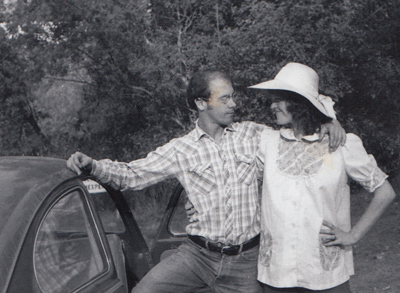The announcement of Marilyn’s pregnancy was one of the major milestones of my life. I had never wanted children, I was too selfish enjoying my own freedom to even consider the responsibilities of parenthood. In truth, at that point in my life, I looked at people with children and wondered why in world that anyone would voluntarily submit to the slavery of parenthood. The thought of getting someone pregnant was my biggest fear and when I learned of Marilyn’s pregnancy, I felt as if I was standing in front of a judge in a court room hearing him pronounce, “Life sentence!”. I was devastated but also I was hopelessly in love. Marilyn made it plain that the end of the pregnancy would be the end of our relationship. With these alternatives resting in the opposing scales of balance, I started down a new life’s path. The first years were tough, but in retrospect, I see that the things of greatest value in my life stemmed from the momentous decisions of that time. Marilyn brought me the family that I had never envisioned myself. It was the gift of a lifetime.
 When I first heard the news, I was still living in my shack on Vashon Island. I was making about $100 a month and living comfortably with my few needs, enjoying, above all, the complete freedom of time. Suddenly,everything changed. Immediately, I packed my Volkswagen Bug with all my possessions and moved into Seattle to seek my fortune. Marilyn and I were not yet living together, and I found a set of rooms that I was able to rent for about $100 a month. Seattle at the time was experiencing a huge economic downturn. Boeing had just laid off thousands and employment opportunities were slim. I started my professional life on the graveyard shift at a ‘Jack in the Box’ restaurant. When I was applying to the ‘Box’ manager for the position, he noted my Stanford degree on the application, and asked if I didn’t think I was over qualified. I said I hoped that wouldn’t be a problem.
When I first heard the news, I was still living in my shack on Vashon Island. I was making about $100 a month and living comfortably with my few needs, enjoying, above all, the complete freedom of time. Suddenly,everything changed. Immediately, I packed my Volkswagen Bug with all my possessions and moved into Seattle to seek my fortune. Marilyn and I were not yet living together, and I found a set of rooms that I was able to rent for about $100 a month. Seattle at the time was experiencing a huge economic downturn. Boeing had just laid off thousands and employment opportunities were slim. I started my professional life on the graveyard shift at a ‘Jack in the Box’ restaurant. When I was applying to the ‘Box’ manager for the position, he noted my Stanford degree on the application, and asked if I didn’t think I was over qualified. I said I hoped that wouldn’t be a problem.
Marilyn and I were married in a ceremony with only two witnesses, under a full moon at the end of August, 1974. We moved into the small apartment and struggled to make our way. The apartment was in the Renton area of Seattle, home of Pacific Car and Foundry, one of the biggest foundries on the West Coast. “Pac-Car” cast everything from military tanks to railroad cars. They had been in business for a long time, and were a prominent fixture of Pacific Northwest industry.
The employment lines at Pac-Car were packed with people trying to find a job. In spite of the dismal prospects, I came up with my own strategy. I learned a lot from this lesson. Every morning at 7:00 am, when the employment office opened, I was there fresh from the graveyard shift at Jack in the Box. I went to the same line every day, talked to the same woman, behind the same counter. Though the news was always the same, “no jobs today”, I bargained that consistence and persistence were the keys to success in this particular situation. At the end of the second week, I was told to step into an adjoining room, where I was given an entry level position: “Chipper/Grinder, on the foundry floor, graveyard shift.”
My first night at work, I felt as if I had arrived at a scene from Dante’s Inferno. There was exploding fire and the noise was so deafening that in order to communicate, you needed to yell directly into the ear of your audience. In my capacity as a ‘chipper and grinder’, I was using heavy pneumatic tools to smoothed the edges off huge steel castings, in this case, the huge housings (about one ton each) for ship winches. It took about 45 minutes to clean each one. The sparks from the grinder flew everywhere and burned away at any part of your clothing uncovered by heavy leather aprons. The chipper part of the operation, was a small (30 lbs.) jack hammer used to remove material that could not be reached with the grinder. There were a dozen other men doing the same work in the same area. The noise level was deafening. Not far away were huge furnaces of molten steel. Wrestling with the heavy tools over an eight hour shift, was exhausting, but I thought of it much like a athletic training work out.
Every week I would wear out a pair of work pants from sparks and tears. Of course, I purchased these from the Goodwill, trying to save every penny. The pay at the foundry,though, was much better than Jack in the Box, and I was relieved to have employment. Mer’s due date was approaching, and money disappeared as quickly as it arrived.
At this same time, I learned that Boeing Corporation,in spite of all their lay-offs, was offering a free school to train draftsmen in their own techniques. This dove tailed well with my career interests in illustration arts. I had picked up many drafting skills on my own already. I hoped to eventually get into an illustration group at Boeing. I was excited by the idea of painting beautiful photo realistic renderings of airplanes soaring through the clouds. Much of the art work I had done earlier in my life, even back to Jr. High School, had focused on airplanes. Characteristically the work of youthful aspiring artists, reflects their young passions. With me it was airplanes and race cars.
I signed up for their free school and was soon attending classes for six hours, five days a week in the evenings. This left few hours in the day to sleep and eat, since I went directly from school to the foundry, then returned to the apartment to eat breakfast and sleep from about eight in the morning, until four in the afternoon, when I started another cycle. It was a distinct change from my life as an idyllic recluse on Vashon. I saw little of Mer, except on the all too short weekends, when I mostly wanted to catch up on sleep.
 I graduated at the top of my class and was set up to work for Boeing but my military draft deferment status, as a result of my Captain America theatrics, staged as a creative act of civl disobedience to avoid returning to Vietnam at any price, surfaced, and I was denied employment. Thus I learned another lesson about living outside the system. But living inside the system of the industrial/military complex, was simply not a fit for me on any level, and I never attempted to sleep with the enemy again in my life. In my self defense, at this period of my life, I was confused, and desperate to find a right livelihood.
I graduated at the top of my class and was set up to work for Boeing but my military draft deferment status, as a result of my Captain America theatrics, staged as a creative act of civl disobedience to avoid returning to Vietnam at any price, surfaced, and I was denied employment. Thus I learned another lesson about living outside the system. But living inside the system of the industrial/military complex, was simply not a fit for me on any level, and I never attempted to sleep with the enemy again in my life. In my self defense, at this period of my life, I was confused, and desperate to find a right livelihood.
I felt intense scrutiny from both my new in-laws, and my own parents, as well as friends and acquaintances. All seemed to be waiting to see how I was going to step up to the plate and provide for my new family. Meanwhile, I combed the want ads for any suggestion of an opening which would utilize my artistic skills. I had by this time, twenty six years old, made a mental commitment to pursue my artistic expression, at all costs. I made many sacrifices to stay on this path. It was painful to see past acquaintances, whose talents and drive seemed meager, some from High School or college, now prospering in their careers, buying new cars, while I was dumpster-diving in my spare time. My pride and natural vanity were taking severe blows and I felt that I saw in the eyes of people communicating with Mer, that they wondered at why she had wound up with such a loser. When I look back at those days, which could have been filled with the joy and excitement of starting a new family, I remember mostly a desperate struggle to find some path.
By an incredible stroke of irony, while seeking any employment related to my art, I was hired by a subcontractor to Boeing, named “Milmanco”, (Military Manual Company). The company made the manuals for newly purchased airplanes. Since each control panel of a different airplane was somewhat unique, the subcontractor had the job of creating the graphic representations needed in the manuals. The work ,all pre-computer, involved what was known as ‘cut and paste’ in the graphics trade. I found myself working at the main Boeing plant south of downtown Seattle. The mood in the office where I worked was unbearable. The energy level seemed geared to doing as little as possible throughout the day. There was not the slightest spark of inspiration or enthusiasm from any quarter. And the work itself was as boring and tedious as I could ever imagine. While there, however, I made all the inquiries I could, as far as finding work in an illustration group. But I sensed that within the huge corporate bureaucracy, my chances of making it into such an exalted group, were zero, unless perhaps, I invested my entire life working for Boeing, a grim prospect. Thus it was that I stayed with the Boeing position for exactly two weeks before I said “take this job and shove it”, and was back on the streets, much to the consternation of my new wife. It was around this time that I started my business with Tom’s Truck.